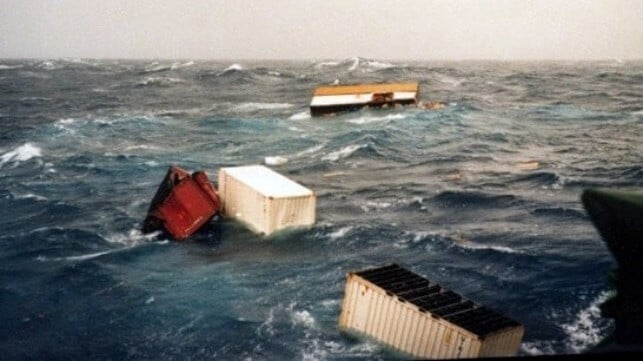Vessel Rerouting Contributed to Increase in Containers Lost at Sea

While the overall trend continues to show improvement in the number of containers going overboard, the World Shipping Council reports that in 2024, rerouting of vessels to avoid the hostilities in the Red Sea directly contributed to an increase in boxes lost at sea. The trade group points to the industry’s continuing efforts, highlighting that in the absence of a large casualty, the rate of losses continues to improve.
In 2024, the World Shipping Council estimates that 576 containers were lost at sea out of approximately 250 million transported. The number was up by 221 containers from the prior year, but most of the increase is directly traced to a number of incidents off the Cape of Good Hope as containerships avoided the Red Sea and encountered strong winter weather. WSC points out that even with the increase, it was significantly below the 10-year average of 1,274 containers lost at sea.
“Despite continued loss-prevention efforts by the industry, the re-routing of transits away from the Red Sea and around the Cape of Good Hope to keep global commerce moving has ocean carriers navigating one of the world’s most challenging routes, as highlighted in this report,” said Joe Kramek, President & CEO of the World Shipping Council.
The South African Maritime Safety Authority (SMSA) tracked three major incidents between July and September 2024; CMA CGM Benjamin Franklin lost 44 containers, CMA CGM Belem lost 99 boxes, and MSC Antonia lost 46 boxes, all while encountering heavy weather off South Africa. MSC Taranto in October lost five empties also in the region.
WSC highlights the area as “well-known for hazardous maritime conditions,” while reporting that the number of vessels taking the route spiked by 191 percent compared to 2023. It calculates that 35 percent of 2024’s losses at sea were due to routing around South Africa.
Over the past 17 years, there have been three major spikes in including in 2013 when MOL Comfort was lost with over 7,000 TEU. The numbers spiked again in 2020 and 2021 as vessels including ONE Apus, ONE Aquila, APL England, Maersk Eindhoven, and Maersk Essen all lost or damaged boxes in heavy seas. The industry linked many of the problems to a phenomenon known as parametric rolling and increased efforts to warn seafarers and to manage the uncontrolled and sudden violent rolling.
World Shipping Council supports new efforts that include the mandatory reporting for lost containers coming into effect in 2026 from the International Maritime Organization, as well as enhanced cargo safety screening, and further scientific research into loss prevention. Participating with MARIN, WSC says a report will be sent to the IMO in September on major advancements in improving container safety. It identifies the reasons for losses, develops tools to prevent incidents, and provides recommendations for the IMO’s revised regulation.
This year has been a challenging one for the industry with SM Portland losing 115 boxes overboard during a Pacific storm in March. However, fire is emerging as the key issue with Maersk Frankfurt struggling with a fire that killed seafarers in 2024, and currently, a fire has been burning for three weeks aboard Wan Hai 503, which also claimed the lives of seafarers. MSC Elsa 3 was also lost off India last month and MSC Baltic III grounded off Canada in a winter storm.

that matters most
Get the latest maritime news delivered to your inbox daily.
The trade group emphasizes that safety is a shared responsibility pointing to new efforts to address mis or undeclared dangerous goods, including the first industry-wide system for screening. It reiterates basic issues such as conscientiously and correctly packing, declaring, and weighing containers and their contents. WSC, in partnership with the National Cargo Bureau, has developed a new safety program with industry best practices that will be rolled out this year. It also points to changes in safety regulations, including declaring charcoal shipments as dangerous goods and new treatment, packing, and stowage requirements.
